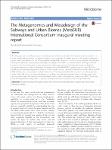The Metagenomics and Metadesign of the Subways and Urban Biomes (MetaSUB) International Consortium inaugural meeting report
Robert Koch-Institut
The Metagenomics and Metadesign of the Subways and Urban Biomes (MetaSUB) International Consortium is a novel, interdisciplinary initiative comprised of experts across many fields, including genomics, data analysis, engineering, public health, and architecture. The ultimate goal of the MetaSUB Consortium is to improve city utilization and planning through the detection, measurement, and design of metagenomics within urban environments. Although continual measures occur for temperature, air pressure, weather, and human activity, including longitudinal, cross-kingdom ecosystem dynamics can alter and improve the design of cities. The MetaSUB Consortium is aiding these efforts by developing and testing metagenomic methods and standards, including optimized methods for sample collection, DNA/RNA isolation, taxa characterization, and data visualization. The data produced by the consortium can aid city planners, public health officials, and architectural designers. In addition, the study will continue to lead to the discovery of new species, global maps of antimicrobial resistance (AMR) markers, and novel biosynthetic gene clusters (BGCs). Finally, we note that engineered metagenomic ecosystems can help enable more responsive, safer, and quantified cities.
Dateien zu dieser Publikation
Keine Lizenzangabe

